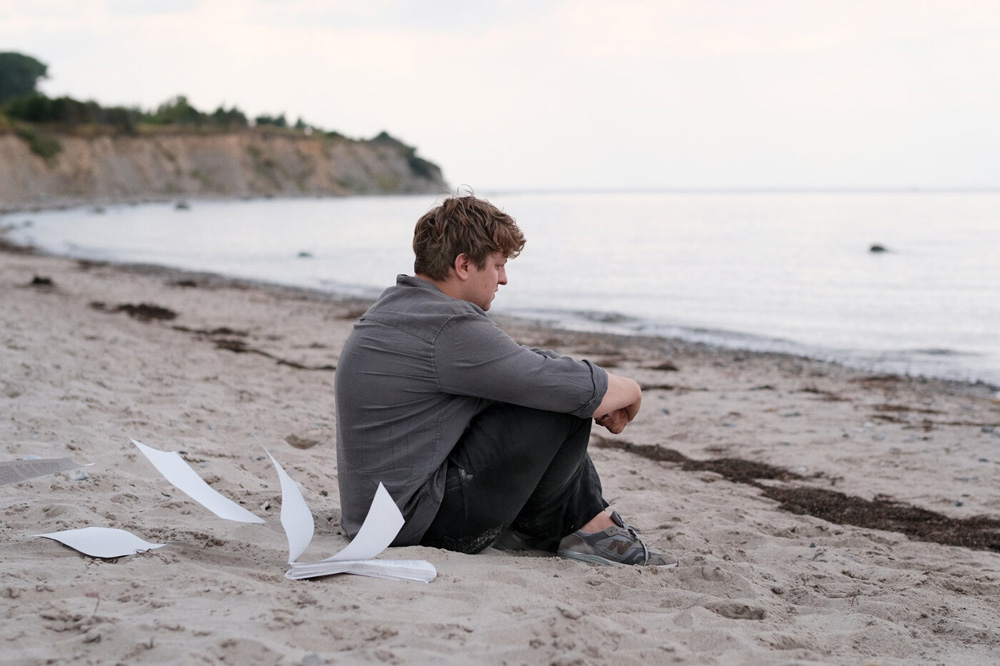The conflict for “Afire” crystallized naturally when all Christian Petzold wanted to do was go outdoors. Europe was about to go into COVID lockdown shortly after his last film “Undine” premiered at Berlinale 2020 and his French distributors Les Films du Loshange kindly sent him a care package of Eric Rohmer films that could give him at least the sensation of a warm breeze, even if he wouldn’t dare leave his home. But amidst images from “Pauline at the Beach” and “The Collector” that danced around in his head, Petzold’s mind drifted towards an artist of a far different disposition than his own, using his pursuit of writing as an excuse not to live, declining invitations to go swimming in the sea when he has a novel to work on and the lack of interest in experiencing life starts to show up in the pages he’s written.
If Leon (Thomas Schubert) is stuck in a rut, Petzold seems to be reinvigorated in what seems to be his most light and playful film to date, though the writer/director’s work has never been lacking for inspiration, long showing a gift for presenting people with deep inner lives and in this case, it would be someone who burrowed so deeply inside that finding their way out might be difficult. Leon is right up there with the tortured protagonists of films such as “Phoenix,” which starred Nina Hoss as a cabaret singer who wonders if her husband will recognize her after surviving the concentration camps in World War II, and “Undine,” featuring Paula Beer as a historian bound to take revenge on a former lover, but when self-inflicted, it leads to painfully incisive humor as the writer works futilely on a second novel that no one seems to like, including himself. Even his publisher Helmut (Matthias Brandt) who comes to see if Leon is staying on deadline doesn’t seem immune to the charms of the summer cottage of his friend Felix (Langston Uibel) where their unexpected roommate Nadja (Beer) wants to make up for the loud sounds of passionate lovemaking emanating from her side of the house late at night by offering to cook, but all the delightful distractions in the world can’t seem to draw the author away from writing what might end up being his obituary if he doesn’t get out more.
Set alongside the Baltic Sea, “Afire” has the restorative quality of a great vacation but the rich insight of someone being able to step outside themselves to see who they really are, and as the director is set to take the U.S. by storm by accompanying “Afire” during its opening weekend in New York and Los Angeles with a slew of Q & As en route to theaters across the country, he graciously took a moment to talk about how a film starts revealing itself to him as he gets collaborators involved and surrendering to the narrative that starts taking shape, yielding not only a good story on screen, but plenty off of it as well.
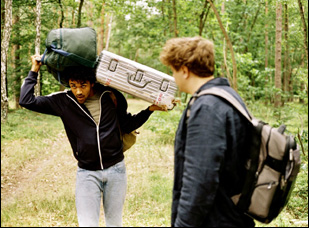
Yeah, it was refreshing. It was a little bit like [the film’s introductory scene] when the two guys with their suitcases are going through the forest, and they reached this house, this cabin in the woods. For me, it was a little bit like when I start to write the script, I have a picture of this house in the forest like in an old tale. But I don’t like movies which are coming out of my head. I want to find the stories on the street. I want to find the locations. I don’t want to build them up, but in this, I remember this house I had in my mind during writing and when we found it later in the forest and we built it up with the roof and so on, it was as if it came out of my mind, so the start of the filming was a little bit like as if this is my first movie. It was so innocent — the situation, the house, the meadows, the Baltic Sea— it was so clean and clear and it was so simple that I was really engaged about this new feeling of working.
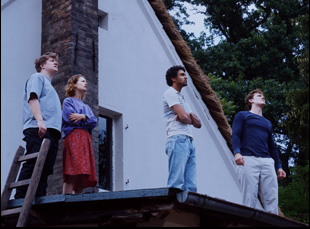
When we have found the beach and everything, all the actors and I are on a train and we are driving to this place, [even] the actors who were there for just one day of shooting or so and I was like a guide with an umbrella. I [would tell them], “This is the room where you both are sleeping. This is the kitchen, this is the kitchen sink. This is the washing machine. This is the place you can work. This is the hole in the forest [where] you can leave to the Baltic Sea,” so I’m talking and talking like a guide and then it was 2 p.m. or something like that. We have a lunch break. There are two tables. And on one table, the four young actors sat down and [start] talking, and at the other table, the old ones, me and Matthias Brandt, who’s playing the publisher, had to sit and the young actors start to play cards. They are in a very good mood. And I know this is a good sign.
Matthias, who is a friend of mine, said to me, “Everything will work. They are good with each other.” They like it, what is happening here [will happen] in two or three weeks.” But I said, I’m a little bit jealous because they are playing cards and we are not invited. They’re on the other table. They don’t look at us or ask us if we want to play cards with them. And at this moment, I know they need their youth. They need their innocence. They don’t want to be part of the world of parents, publishers, directors. They are for themselves. This is great, but also on one hand, a little bit disappointing for me because I like to play cards. [laughs]
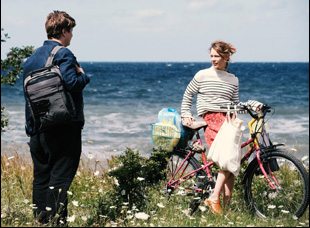
Yeah, this house doesn’t exist in reality. It’s a house [owned by] some farmers, which is a ruin, but I liked the atmosphere there and it could be built up as a dream house. The forest is great and it has a good sound. The production designer and the DOP and I would sit together and I said, “This is a portrait of a man who’s watching the world and the world is opening its doors for him, but he can’t pass because he has fear of losing control.” So we are building a house with parallel views — you can see the terrace from the window, and from the terrace you can see inside the kitchen, so from the kitchen you can see through the hole to the forest. It’s a cinematographic house, and it gives the actors possibilities. And during the rehearsals, they used the possibilities. It was such a great time because the rehearsals are not like classical rehearsals on a stage.
I’m sitting there outside, smoking or drinking a coffee, and I watch the actors. They’ve tried to find their positions [asking questions to themselves like] “Where is my chair? Where can I stay? Where are you there?” It’s like when a family wants to rent a flat, and they come into this flat, and they see the children are looking [for] which room could be mine? And the mother is looking which room could be my working place and so on, so you see that the innocence of the place is now getting a structure. It is a very important part of the rehearsal to find this position in the scene, and during the editing, I was astonished that they also find the right distance during the dialogue — through a window, very close to each other, divided by a door. They find it because this is dramatic. This is a dramatic structure — how close you are, how distant you stand. This was like a dance, a summer dance for me. And it doesn’t make so much work. And as a Protestant, when something doesn’t cost me sweat and effort, then I disbelieve it because work has to be hard and painful. [laughs] But this movie was not hard and painful, so I never trusted it really until the 20th day of shooting. In this moment, I know I think it could be great, but the first few days, I thought this could be a very ridiculous comedy. I don’t know.
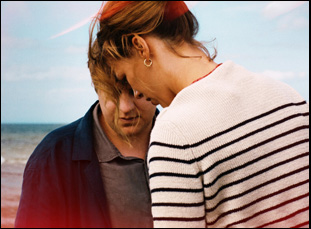
Yeah, I say to the actors, “Most movies you are in, the score is more than 75 percent [of the film], so you never hear the world. You hear the dialogue, the music and some important noises, but this movie is about fire, the forest, nature, and loneliness, so I want to hear everything.” During this rehearsal time when we visited the house and the beach, I asked them, “Can you close your eyes and hear what is happening here?” The Baltic Sea is different sea than the Atlantic, for example. It has another sound. And this fir tree forest has another sound than a forest with deciduous trees with leaves. Sometimes it’s a mixture.
I don’t want [these sounds] in the movie as a score. It’s just music for the characters — for their bodies and their dance and their desires and I want to hear everything. When [Leon] stands up in the morning and he’s making his cereals, he’s always talking about work, but he’s so lazy, so he’s doing milk and cereal, not more, and then he’s eating like this. Then he hears [Nadja] whistling and you can hear a fly and two birds. That’s in reality, so the world is coming to him in his in his bubble and he looks up and then she’s crossing there. The reality always starts with acoustic things, and then the picture comes later, like the sexuality [Leon] can overhear] in the night. It’s it’s always acoustic. You imagine something and then you see it in reality later.
It’s not uncommon in your films to give over the screen to another work of art in such a way that you can see how it unlocks something for the characters — I remember when we spoke for “Barbara,” it was Rembrandt’s “The Anatomy Lesson of Dr. Nicholaes Tulp” and here you’ve got Nadja reciting the Henrich Heine poem “The Asra,” which reveals a very specific turning point for her relationship with Leon, but also clearly has an emotional effect on them just generally. How did it make it into the film?
I think it was two years ago and my wife prepared a dinner for friends — and Paula was invited, and I must say, Paula is the only actress who’s invited in our house because she’s really a fantastic character. [laughs] And there was a friend of mine who formerly was the Dean of the California Institute of Arts in the ’90s, who was there, and Franz Rogowski too, and suddenly we’re talking about Düsseldorf and Heinrich Heine, and how he’s feeling the antisemitic structures in Germany in the 19th century and so on. And then [my friend] would recite “The Asra,” and I was totally transfixed because it’s a fantastic poem. And on the other hand, it’s a little bit embarrassing. Someone is not singing a song, someone is reciting a poem and I think it was Franz Rogowski who said, “Once again.” And he said it again. And this was such a big moment that “The Asra” finds its place in “Afire.”
“Afire” opens on July 14th in New York at Film at Lincoln Center and the IFC Center, where Christian Petzold will be doing Q & As on July 14th after the 6:15 pm and 7:30 pm screenings, respectively, and in Los Angeles at the Laemmle Royal, where the director will be doing a Q & A after the 7:10 pm screening on July 15th, and at the American Cinematheque‘s Los Feliz 3, with a Q & A following the July 16th screening at 4 pm, and the Aero, with a Q & A following the 7:30 pm screening. A full list of cities and dates as it expands across the country can be found here.




